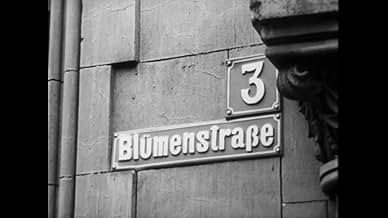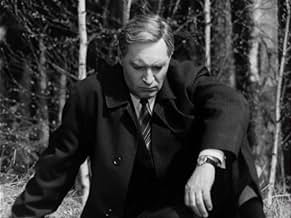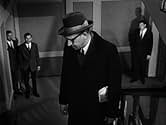Semnadtsat mgnoveniy vesny
- Série de TV
- 1973
AVALIAÇÃO DA IMDb
8,7/10
5,3 mil
SUA AVALIAÇÃO
Adicionar um enredo no seu idiomaDuring World War II, a Soviet undercover spy manages to infiltrate the Nazi elite.During World War II, a Soviet undercover spy manages to infiltrate the Nazi elite.During World War II, a Soviet undercover spy manages to infiltrate the Nazi elite.
Explorar episódios
Avaliações em destaque
Well, I thought this was a fantastic production - very engrossing, with excellent performances, artistic direction, and intelligent scripts. It's a great example of how a television mini-series, as a format, can bring a novelistic type of depth of story and character to the screen. And it's easy to see why it's still so iconic in Russia.
By any technical definition, this particular series is propaganda -- it was ordered specifically by the Soviet government in order to interest more young people in the spy service. Any maybe it did. But "Seventeen Moments of Spring" acts in a way that's completely opposite to the propaganda usually works. Instead of simplifying issues and making them into easy black-and-white decisions, this series complicates them -- dwelling on the difficulty of the heroes' decisions, and taking care to imbue the Geramans with more humanity rather than less.
It's notable and, I think, key to the series' success that the centerpiece of each episode consists of one or two long, tense, subtle dialogue-heavy scenes. The contrast of the action-oriented expectations from the subject of spies and war with the tense character drama that we see is excellent.
The integration of real footage from the war and cameos from other major players are really well-apportioned, and give the character scenes that we're watching more importance to us for our having been reminded of their contextual importance.
The music is about perfect as well, helping to set the tone. In all, it's a spy drama who main modes are subtle, thoughtful melancholy in the foreground, with the element of constant danger tinging it from the background. In that, it's tone is unexpected and very successful. More than worth watching, even for those who don't normally go in for war or spy films.
By any technical definition, this particular series is propaganda -- it was ordered specifically by the Soviet government in order to interest more young people in the spy service. Any maybe it did. But "Seventeen Moments of Spring" acts in a way that's completely opposite to the propaganda usually works. Instead of simplifying issues and making them into easy black-and-white decisions, this series complicates them -- dwelling on the difficulty of the heroes' decisions, and taking care to imbue the Geramans with more humanity rather than less.
It's notable and, I think, key to the series' success that the centerpiece of each episode consists of one or two long, tense, subtle dialogue-heavy scenes. The contrast of the action-oriented expectations from the subject of spies and war with the tense character drama that we see is excellent.
The integration of real footage from the war and cameos from other major players are really well-apportioned, and give the character scenes that we're watching more importance to us for our having been reminded of their contextual importance.
The music is about perfect as well, helping to set the tone. In all, it's a spy drama who main modes are subtle, thoughtful melancholy in the foreground, with the element of constant danger tinging it from the background. In that, it's tone is unexpected and very successful. More than worth watching, even for those who don't normally go in for war or spy films.
This movie is one of the top 10 movies for any Russian. Even if you are a foreigner, if you have subtitles or other mean of understanding the plot - you will be stick to your chair for all 11 (is it 11 or 13?) episodes.
The book of Semenov was great and the movie is even better. Great actors, who knew what the war is and how to show it. Amazingly intense plot, without any special effect, all rooted in the chess game between a Russian spy and German (nazi) opponents. Stylish black and white. In 1973 it was common, now it just looks good, as a true documentary.
What else? Music is perfectly suited to the moment and the whole movie is not seeking to draw a line between "good" and "bad" guys but, instead, trying to draw you into the tense atmosphere of the last 3 months preceding the end of WW2.
If you ask a few Russians in the street of Moscow or any other city what number 17 means to him, I bet $100 that over 90% will say "17 Moments of Spring" which stands for "Semnadtsat mgnovenij vesny".
The book of Semenov was great and the movie is even better. Great actors, who knew what the war is and how to show it. Amazingly intense plot, without any special effect, all rooted in the chess game between a Russian spy and German (nazi) opponents. Stylish black and white. In 1973 it was common, now it just looks good, as a true documentary.
What else? Music is perfectly suited to the moment and the whole movie is not seeking to draw a line between "good" and "bad" guys but, instead, trying to draw you into the tense atmosphere of the last 3 months preceding the end of WW2.
If you ask a few Russians in the street of Moscow or any other city what number 17 means to him, I bet $100 that over 90% will say "17 Moments of Spring" which stands for "Semnadtsat mgnovenij vesny".
10Yuri-8
One of the little-recognized deficiencies of spy movies is that 'action'--chases, shootings, explosions, etc.--is dominant content. Of course, the trend caters to modern audiences that are addicted to sound and special effects. However, action-driven spy movies (e.g., James Bond) suffer from 3 major defects: 1)They are not believable 2)They contain little or no acting performances to speak of 3)As such, they are easily forgettable. This is not the case with "17 moments of spring" (hereafter SMOS)
The 12 episodes of the series have been specifically shot in Black and White, in fairly simple studio sets, with no special visual effects. What makes SMOS the favorite of audiences, is a gamut of absolutely incredible acting. Each role, even a minor one, casts an "all-star" Soviet actor, and they deliver deep psychological performances. Tikhonov is an obvious star as Stierlitz, but consider Leonid Bronevoy as Mueller, the friendly, always suspicious and incredibly cruel inside Gestapo chief. Or Oleg Tabakov, as cheerful Schellenberg of the German intelligence. Or Plyatt as very vulnerable and very human Pastor Schlag who nevertheless embodies the power of the Church.
So essentially SMOS is not a spy movie, but a tight psychological drama. But we must not forget the subject, and it is an important one, based on a major real life event: in early 1945, trying to finish off the Nazi Germany, the Russians found out that SS-gruppenfuehrer Karl Wolff (essentially a representative of the odious Himmler) attempted to negotiate a separate piece with the Americans in Italy. The talks were top-secret (OSS star Allen Dulles was the US negotiator) and essentially meant a betrayal of Russia by its anti-Nazi allies. SMOS is about how the Russians discovered the secret and forced the end to negotiations.
In short, this is one of the greatest all-time spy thrillers. Just as "Rosemary's Baby" is arguably the best horror movie because of its acting and directing, so does SMOS shine through the mediocrity we are fed today. I wish it were shown to the wide Western audiences, so that they can see for themselves!
The 12 episodes of the series have been specifically shot in Black and White, in fairly simple studio sets, with no special visual effects. What makes SMOS the favorite of audiences, is a gamut of absolutely incredible acting. Each role, even a minor one, casts an "all-star" Soviet actor, and they deliver deep psychological performances. Tikhonov is an obvious star as Stierlitz, but consider Leonid Bronevoy as Mueller, the friendly, always suspicious and incredibly cruel inside Gestapo chief. Or Oleg Tabakov, as cheerful Schellenberg of the German intelligence. Or Plyatt as very vulnerable and very human Pastor Schlag who nevertheless embodies the power of the Church.
So essentially SMOS is not a spy movie, but a tight psychological drama. But we must not forget the subject, and it is an important one, based on a major real life event: in early 1945, trying to finish off the Nazi Germany, the Russians found out that SS-gruppenfuehrer Karl Wolff (essentially a representative of the odious Himmler) attempted to negotiate a separate piece with the Americans in Italy. The talks were top-secret (OSS star Allen Dulles was the US negotiator) and essentially meant a betrayal of Russia by its anti-Nazi allies. SMOS is about how the Russians discovered the secret and forced the end to negotiations.
In short, this is one of the greatest all-time spy thrillers. Just as "Rosemary's Baby" is arguably the best horror movie because of its acting and directing, so does SMOS shine through the mediocrity we are fed today. I wish it were shown to the wide Western audiences, so that they can see for themselves!
I watched this movie many years ago with Spanish subtitles. I still remember the remarkable acting,intriguing action, and excellent scenography that transports the viewer to Germany during the nazi's years. The plot is very interesting beside of having some historical touches.In a now gone URSS's book compiling secret correspondence between Stalin and other head of states, the former Soviet dictator mentioned Maxim, a soviet spy "planted" in the high ranks of nazy's Germany during the war years. Seventeen Moments of Spring is an excellent movie that I personally would like to enjoy again if it were available with English subtitles in video stores in our country.
10lowway
One of the best films of Soviet Union. It is not about intrigues and spy games, though the plot is really gripping. Last months of WW II. Shtirliz - Soviet resident is under suspection of Gestapo. Being in the heart of Hitler's sistem, he struggled with hazi regime long years. The Third Reich bosses Himmler, Shellenberg, Wolf understand that their game is over, they try to save their own skin and seek for separate peace with USA and Great Britain. This treaty could be big calamity for Soviet people, and USSR secret service breakes ignouble plans of nazi. The famouse Soviet actor Vyacheslav Tikhonov (Prince Andej in "War and peace" by Bondarchuk) have excellent incarnated the interesting and very complicated character of Shtirliz. All other roles were played by the best actors of Soviet screen.
Some parts of film were shot in GDR. For the first time after WW II in Soviet cinema appeared the German soldier character, who was kind and humane person. Gestapo guard Helmut saved Russian secret service woman Katya with her child, but himself perished. This role was brillant played by GDR actor Otto Mellies.
"Seventeen moments of spring" is about people, who were cut off their home, country, families in order to fighting with nazi criminals.
Some parts of film were shot in GDR. For the first time after WW II in Soviet cinema appeared the German soldier character, who was kind and humane person. Gestapo guard Helmut saved Russian secret service woman Katya with her child, but himself perished. This role was brillant played by GDR actor Otto Mellies.
"Seventeen moments of spring" is about people, who were cut off their home, country, families in order to fighting with nazi criminals.
Você sabia?
- CuriosidadesThe person responsible for extras casting was Jewish and was casting a lot of his friends and relatives in tiny parts. As a result, when the military consultant (from the KGB) saw the chosen actors, he said that most of the guards at Nazi headquarters looked like soldiers of Israeli army, not elite SS soldiers, and demanded that they change them to more appropriate looking actors. As a result, the roles of SS guards were played by military cadets of the frontier-guards schools from Tallinn (Estonia) and Riga (Latvia), who, being tall, blonde and blue-eyed looked more like real SS soldiers.
- Erros de gravaçãoThe reels on the tape decks often have too much tape to be held by the reels.
- Citações
Heinrich Mueller: These days you can not believe anybody. Even yourself. You can believe me, though.
- ConexõesFeatured in Nie ma rózy bez ognia (1974)
- Trilhas sonorasMgnoveniya
(uncredited)
Music by Mikael Tariverdiev (uncredited)
Lyrics by Robert Rozhdestvensky
Performed by Iosif Kobzon (uncredited)
Principais escolhas
Faça login para avaliar e ver a lista de recomendações personalizadas
- How many seasons does Seventeen Moments of Spring have?Fornecido pela Alexa
Detalhes
- Data de lançamento
- País de origem
- Centrais de atendimento oficiais
- Idioma
- Também conhecido como
- Seventeen Moments of Spring
- Locações de filme
- Empresas de produção
- Consulte mais créditos da empresa na IMDbPro
Contribua para esta página
Sugerir uma alteração ou adicionar conteúdo ausente






















